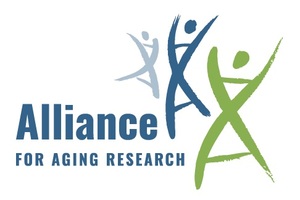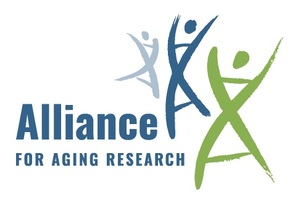
The Alliance for Aging Research's survey spotlights misconceptions about agitation symptoms and their toll on unpaid and family caregivers
WASHINGTON, Nov. 12, 2025 /PRNewswire/ -- Nearly half (49%) of those caring for someone experiencing agitation symptoms as part of their Alzheimer's dementia reveal that the agitation symptoms are harder to manage than memory loss alone, according to a new national survey by the Alliance for Aging Research. The Agitation Blindspot in Alzheimer's Care Report underscores the need for unpaid and family caregivers to feel empowered to have open conversations with healthcare providers on how to recognize and manage the symptoms of agitation in Alzheimer's dementia, which often include restlessness, pacing, wandering, shouting, repetitive questions, and verbal and physical aggression.¹
The survey, conducted by Wakefield Research and sponsored by Otsuka America Pharmaceutical, Inc. (Otsuka) and Lundbeck LLC (Lundbeck), asked 1,000 U.S. adults and 1,000 U.S. unpaid and family caregivers of people with Alzheimer's disease about their knowledge, perceptions, and experiences with symptoms of agitation in Alzheimer's dementia. The findings highlight the overall misconceptions around agitation, as well as the emotional strain and practical challenges facing caregivers of people living with agitation symptoms as part of their Alzheimer's dementia:
- 40% of adults in the U.S. do not link agitation symptoms to Alzheimer's disease.
- 73% of caregivers of people with Alzheimer's disease believe agitation requires the same care approach as memory loss alone.
- 93% of caregivers of people experiencing symptoms of agitation in Alzheimer's dementia feel overwhelmed or emotionally drained.
- 32% of caregivers of people experiencing symptoms of agitation in Alzheimer's dementia have been reluctant to discuss agitation with a healthcare professional because they feel guilty or fear talking about the person they care for in this way.
- 25% of caregivers of people experiencing symptoms of agitation in Alzheimer's dementia report having had to quit their jobs or work fewer hours to accommodate caregiving duties.
About half (44.6%) of people living with Alzheimer's dementia show signs of developing agitation in Alzheimer's dementia.¹ Yet many caregivers of people living with Alzheimer's dementia don't know agitation in Alzheimer's dementia is a separate but related condition, distinctly different from cognitive decline (e.g., memory loss).² This creates a critical gap in caregiver knowledge of how to care for those with agitation, as these new findings show.
"These findings highlight the urgent need to raise awareness about symptoms of agitation in Alzheimer's dementia and to better support unpaid and family caregivers, who too often face this journey in isolation," said Sue Peschin, President and CEO of the Alliance for Aging Research. "We encourage caregivers to talk with their loved ones' healthcare professionals about any changes in behavior they see, so doctors have the full picture and can help identify the best strategies and support."
"Most people still think of Alzheimer's only as memory loss," said caregiver Lamia Scott, who cares for her mother, Marvie, who has lived with agitation in Alzheimer's dementia for the past year. "When agitation begins, it can be frightening and confusing. But understanding it's part of the disease—not just a loved one's behavior—helps caregivers feel less isolated and more hopeful. With greater awareness and support, we can be better prepared to manage these challenges."
The Alliance for Aging Research encourages caregivers to speak with a healthcare provider if the person they care for with Alzheimer's dementia is experiencing symptoms such as restlessness, pacing, wandering, shouting, repetitive questions, and verbal and physical aggression.¹
To explore educational videos and practical resources about agitation in Alzheimer's dementia, visit AlzheimersAgitation.org.
Survey Methodology
The Alliance for Aging Research's Agitation Blindspot in Alzheimer's Care Survey provides an overview of agitation in Alzheimer's dementia and describes results of two, distinct, online national surveys conducted by Wakefield Research. The surveys are sponsored by Otsuka America Pharmaceutical, Inc. (Otsuka) and Lundbeck LLC (Lundbeck).
The first survey was conducted among 1,000 U.S. Alzheimer's caregivers, between April 21 and May 5, 2025, using an email invitation and an online survey. The term "caregivers" was defined as unpaid or family caregivers who regularly provide care for someone with Alzheimer's disease.
The second survey was conducted among 1,000 nationally representative U.S. adults ages 18+, between April 21 and May 5, 2025, using an email invitation and an online survey.
Results of any sample are subject to sampling variation. The magnitude of the variation is measurable and is affected by the number of interviews and the level of the percentages expressing the results. For the interviews conducted in this study, the chances are 95 in 100 that a survey result does not vary, plus or minus, by more than 3.1 percentage points from the result that would be obtained if interviews had been conducted with all persons in the universe represented by the sample.
About Alliance for Aging Research
The Alliance for Aging Research is the leading nonprofit organization dedicated to changing the narrative to achieve healthy aging and equitable access to care. The Alliance strives for a culture that embraces healthy aging as a greater good and values science and investments to advance dignity, independence, and equity. For more than 35 years, the Alliance has guided efforts to substantially increase funding and focus for aging at the National Institutes of Health and Food and Drug Administration; built influential coalitions to guide groundbreaking regulatory improvements for age-related diseases; and created award-winning, high-impact educational materials to improve the health and well-being of older adults and their family caregivers. Learn more at AgingResearch.org.
Media Contact:
Katie Riley
Alliance for Aging Research Vice President of Communications
[email protected]
References
- Halpern R, Seare J, Tong J, Hartry A, Olaoye A, Aigbogun MS. Using electronic health records to estimate the prevalence of agitation in Alzheimer's disease/dementia. Int J Geriatr Psychiatry. 2019;34(3):420-431.
- Senanarong V, Cummings JL, Fairbanks L, et al. Agitation in Alzheimer's disease is a manifestation of frontal lobe dysfunction. Dement Geriatr Cogn Disord. 2004;17(1-2):14-20.
SOURCE Alliance for Aging Research








Share this article